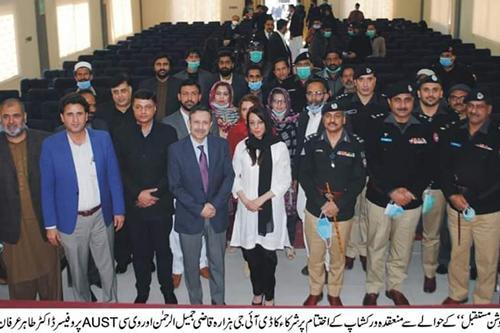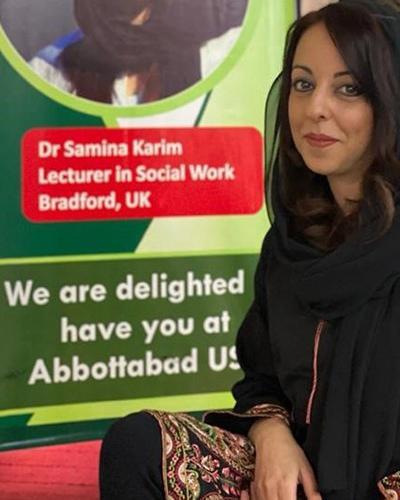Tackling child abuse in Pakistan
Child abuse is now seen as one of the most important challenges facing Pakistan, following high profile cases in recent years, including the rape and murder of six-year-old Zainab Ansari in 2018. Indeed, it was this case that prompted Dr Karim to begin critical research into the issue.
“Child abuse happens in all societies, but it’s now finally being talked about in Pakistan after many years of being a taboo subject,” she says. “However, there is very little research on the issue, so policy makers don’t have the academic findings on which to base their decisions. Despite it being a really sensitive and challenging subject, coming from a Pakistani British background, and with a PhD in historic child abuse, I realised I could help fill that gap.”

Dr Samina Karim, Assistant Professor in Social Work from the University of Bradford, is exploring how different professions respond to the challenge of child abuse in Pakistan. Working with representatives from Pakistan, she recruited participants from key professional groups including religious scholars, teachers from state schools, community health workers, medical hospital staff, special educational needs teachers, police, lawyers, community sports professionals, media professionals and religious minorities.
Using grant funding from the University, she has conducted focus groups with over 300 participants from ten different professions, discussing what they understand of child abuse, their attitudes to it and their professional practice. Each participant completed a questionnaire which captured their knowledge and attitudes towards child abuse and how this in turn was reflected within their professional practice. The groups then discussed the challenges they faced in their profession and what potential solutions there might be.

Findings
Based on the findings from this research, Dr Karim has begun more in-depth studies to understand issues relating to the reporting of abuse and the barriers present in terms of the implementation of child protection legislation. Having employed research assistants based in Pakistan, she is currently exploring the views of lawyers and doctors to develop greater clarity on these topics. So far, more than 600 professionals have taken part and the work is ongoing.
Pakistan does have legislation on the statute books to tackle child abuse, but it’s not always being enforced,” explains Dr Karim. We wanted to understand why so few cases reach the police and even fewer make it to court.
The barriers Dr Karim has identified so far range from cultural attitudes to a lack of effective interagency working. Also, because there are often conflicts between federal and provincial law, it can be difficult to successfully bring forward cases. “The implementation of child protection legislation across the criminal justice system is very dependent on interpretation and that often results in cases not being prosecuted or failing in the courts,” says Dr Karim. As part of her study into the legal barriers to prosecution, she is comparing federal and provincial laws from the Punjab province, which has the highest reported cases of child sexual abuse in Pakistan.
-720x480.jpg)
Reporting the cases…
Doctors are often the first to see injuries caused by sexual abuse and so are a vital step in ensuring cases come to light. Dr Karim’s work with 300+ hospital based doctors aims to determine how many of them are currently reporting any concerns, and if not, why not. Barriers identified to date include a reluctance to get involved in what are seen as ‘family matters’ or subject a family to the culturally perceived ‘shame’ of making sexual abuse in particular, public. Reporting processes also remain unclear within institutions and facilities, which adds to concerns.
The difficulties of bringing successful criminal prosecutions also have a detrimental impact on reporting by frontline medical staff, according to Dr Karim. “We found that many doctors who did report subsequently saw little action taken and as a result, said they would be less likely to highlight potential cases in future”.
Many professional groups are trying to improve how they respond to the abuse of children in Pakistan and are calling on Dr Karim’s expertise to help them do this. She was recently a keynote speaker at a conference on child abuse organised jointly by the Abbottabad University of Science and Technology and police forces of the Khyber Pakhtunkhwa (KPK) province.
It’s encouraging to see so many professional groups actively looking to improve how child abuse is dealt with in Pakistan. We hope that through the research we’re carrying out, we can help provide an evidence base to inform changes in the law or in professional guidelines, to ensure that victims receive the support they need and the justice they deserve.
